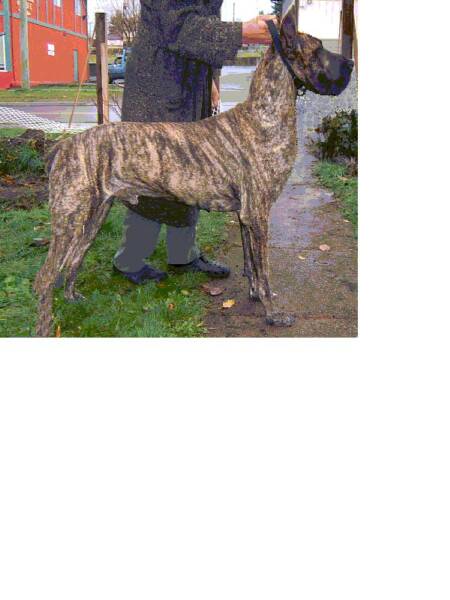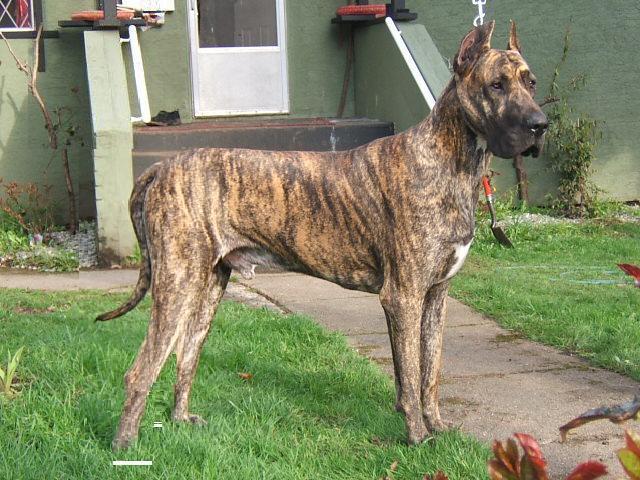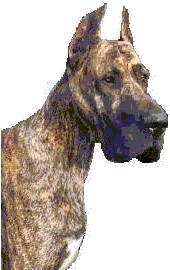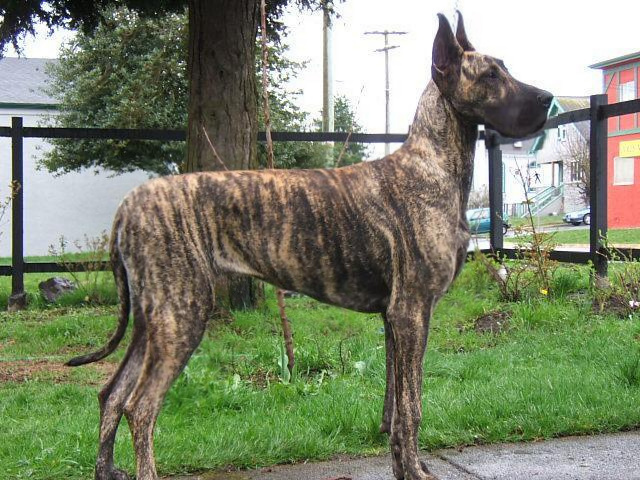If you are a breeder, the first week of the puppy's life, along with the bitch's milk, the pup will need a blended mix of specialty supplementary mix product you can get from your local vet, mixed with quality baby formula and warm goat milk; syringe and bottle-feeding very slowly in addition to nursing.
After 10 days, a mix of the puppy powder supplement, goat milk, yogurt, butter milk, raw liver and cottage cheese, soaked & soft quality puppy food, well blended together and fed before nursing.
At two or 21/2 weeks: mix boiled eggs, fresh veggies, more raw liver, cereal and soaked quality giant breed puppy food, and ground beef, goat milk and yogurt - all blended into soft formula, before nursing.
At or before 4 weeks, depending on the condition of the pup, add a lot of raw beef and some selected cans of balanced meat & veggies-fruits puppy food to the mix - and fresh veggies & fruits in the blender. At this age, they'll need the boost of carefully balanced vitamins and minerals. Don't do it unless you have consulted with a qualified educated reference.
One recommendation; when it comes to which product to choose; I recommend a quality brand with COMPLETE & BALANCED puppy formula. I have always used Eagle Pack Giant breed puppy formula, but now since the company has been owned by another manufacture, we have to see what will happen to the quality of the product. Having said that, keep in mind that if you are using good and actual food with your commercial dog food, meaning, if in addition to the commercial dog food, you also give the Dane actual pieces of real raw beef, pork, chicken and lamb; fresh veggies - fruits, and you give your Dane goat milk - or later any milk, then you would be giving the dog nutrition much greater than the difference between any two brand names of dog foods. In that case, any good dog food such as Eagle pack or some of the Purina specialty pet food products - to name a few - is fine as a side dish with the raw diet.
After another week you start adding more raw meat with the pup's food. Puppy food cans that have balanced product with meat: chicken, beef - lamb and veggies can be used as flavour to mix with the veggies..
Choose both chunks and in-gravy cans to create desirable flavour to the blended mix in the blender. Do that to give th fresh fruits-veggies-rwa liver&meat a flavour the pup will accept. At this age they'll now enjoy and handle raw beef and raw (boneless for now) chicken. They will have a great time and nutrition eating that piece of raw meat.
At 4-5 weeks you'll likely be the only provider as the
bitch will likely be finished with nursing, and you'll be blending Dane mix about 6 to 9 times a day (again,
warm goat milk, puppy cans, ground beef (and whole raw chunks), raw liver, yogurt, fresh blended veggies ground or chopped in the blender.
At 6 weeks. while you'' still continue with the goat milk-based mix, raw meat - I don't grind it any longer after 5 weeks of age. They will eat the chunks of raw meat and will need bigger quantity along with quality puppy food (Eagle Pack Giant breed puppy formula is recommended) will be routine feeding 5 times a day.
Now, for breeders, I would be glad to offer consultation on the female's special diets (and the pre-breeding male diet: The stud needs two diets; one to promote healthy sperms in general, and one to promote either the X or the Y type sperm specifically. Both are similar to diets used for humans when baby sex selection is a factor.
The bitch must carefully have these diets:
- Pre-pregnancy conditioning diet for 2 months before mating.
- Pregnancy diet-1: the zygote stage
- Pregnancy diet-2: the embryo stage
- Pregnancy diet-3: the fetus stage
- Pregnancy diet-4: the final 2 weeks of pregnancy before the puppy is born
- Post giving birth diet-1 for 4 weeks
- Post giving birth diet-2 for 3 months.
Each one of these "7" diets is different and is designed with specific facts, objectives and precautions in mind.
If you are breeding and need help, contact me. These diets will make all the difference in the pup's future. It will of course considerably raise the cost of the pup.
You have to be very careful here. There is no room for guessing. A wrong diet at the early stage of pregnancy can cause defects and dead pups. But, at the same time, adopting a no-diet approach will definitely produce pups with average health or poor health and with the delyed problems and risks experienced in nature.
Without these diets, you compromise the future health of your Danes and you risk the threat of the health problems experienced in the wild if we were to leave things to nature. In nature, an average one to two pups survive per litter, and large breeds develop certain problems. We never had a Dane that developed such a problem. With proper care by the breeder and by the new home, a long healthy life is guaranteed. The argument of leave it to nature is simply ignorant.
If it isn't ignorance that keeps breeders from providing such diet, I could only think of one other reason, cost.
At age 2 weeks, the pups are provided with 6 servings of: butter milk + goat milk + yogurt + cottage cheese + puppy formula + eggs + my own supplementary additive) at a cost of $4 to $6 a meal per litter X 6 servings = $24+ daily which is well over an additional cost of $1,000 before they leave for their homes. And that doesn't even include the more expensive bitch diet. A profit driven operation would tend to cut corners. I know of a couple of breeders who, though they have good looking Danes, they breed as business, 4 or 5 females (and a very happy stud) and that's what they do for living, it's their only income. One of my litter's applicants had a Dane from them, her previous Dane. She wrote that she had two problems: first, the Dane wasn't very smart ( because of close in-breeding), and he developed serious health problems.
Supplements such as fish oil - pure, omega 3 in salmon oil, raw liver-beef-chicken, DHA and Glucosamine with amino acids ... etc. are not a luxury. They are a must at the early stage of the pup's life for both prevention of several problems common in nature - all of which can be corrected at the very early stage. Danes that "drool" like you see some dogs in movies, and Danes that develop joints problems (all of which happens in nature) will not happed if you interfere and correct it with an educated diet during pregnancy and the first 4 weeks of the pup's life. Whelping pups and thinking that it, is both ignorant and irresponsible.
Not all dog food is created equal. You can kill you Dane with bad kibbles. Don't trust what the label reads blindly. I'll explain. Some of the products that say they add real meat-protein, use slaughterhouse scrap unfit for human consumption that includes mammary glands, cancerous tumors, offal, fecal matter and more. The material is denatured with carbolic acid, kerosene, citronella or creosote. In Canada, Birkolene B is used. As well, they add supermarket and restaurant leftover, cattle insecticide patches and flea collars are not removed from dead animals that added to the mix. And:
Artificial chemical preservatives and flavours are another danger. "ethoxoquin used in garden herbicides. Now, ethoxyquin is highly toxic, rate "3" on a scale of 1-6 where 1 is toxic and 6 is fatal when only 6 drops would cause death. But, being used as a stabilizer in rubber products, it was introduced to pet food though it is know to cause birth defects even at the lower level. Now, you may not find ethoxoquin on the cheap pet food label, but that's because regulation require listing what the manufacturer added. It is however added as part of a meat mix they get from a pet food ingredients supplier named it something like beef mixture.
Cheap kibbles also has butylated hydroxyanisole and butylated hydroxytoluene. Some may fool you by listing them as BHA and BHT or adding them to veggies then list them as processed veggies. It is proven that these chemicals affect the neurological development in young animals. Even Iams company was reported using them in some products.
Mycotoxin is another major problem with many brands of pet food. A vomatoxin dose of just 2 ppm is toxic to animals. That's just 2 mg in a whole liter affects the dog's immune system considerably. Scientists were not surprised with the appearance of the mad cow disease, and are expecting new problems to develop in many animals.
Very few exceptional and elite (and expensive) dog food products are OK, but still, you need the wolf's raw diet.
The costly diet is a must. A proper breeding provides the pup with a good foundation before even the bitch was in heat, then during pregnancy and now for the first 6-8 weeks of the pup's life. It'll make all the difference in his future health Dane. Continue with a quality balanced giant breeds puppy food, milk and raw meat.
I advise my breeder friends to follow my diet recommendations and NOT depend on nature's mother milk alone. I often have to remind others over and over that in nature most of pups die and most of the pups that survive develop problems later. The pregnancy diet and the pup diet for the first 2 months will make all the difference in the Dane's life. It is no accident that such cared for pups show better mental aptitude, they are very aware, sharp, developed and walking around (eyes open already) at about 10 days or less - as opposed to 3 weeks. As well, it is no accident getting a pup from a breeder, seeing the pup's parents live a modest 6 years life, seeing all the pup's brothers from the same litter live 5-7 years and your pup is alive and healthy 6 years later at age 11 ... This is no luck matter.
Now, you have to continue the physical and emotional nutrition of the Dane for a long healthy life. Remember that the Dane has emotional needs more than any other breed. He needs attention and needs to be shown that he is loved and that you are happy with him - along with a good diet and exercise.
One last - and very important note:
Never give Danes a Huge, heavy meal as one serving. This is specially important if they may, after eating such a huge meal, rush to run and chase and jump. This can be dangerous.
Do not let them get very hungry then allow them to over-fill their stomach.
That’s why I always offer them an open-buffet limited to only dry food and water, both available to them all day. They’ll know it’s always there and they will eat many small snack-size or even bite-size feedings throughout the day (because they will not wait until they are very hungry then race to inhale as much food as fast as they can when they can). Raw meat, milk and other food is controlled, 1, 2 or 3 serving a day based on the dog's condition & diet. At the moment, I give my Danes one serving every morning of raw meat and milk, one serving of good bone in the evening and good dry food and water available all day.
A quality complete and balanced specialty giant breeds food and fresh water will give them almost most of the basics they need, but not enough. Control the dog food you mix with table scraps because the good taste will make them keep on eating, and control fat content in raw meat. But, remember, raw meat is a must, along with raw veggies & fruits and Dane supplements. In nature, dogs eat raw meat and grass for veggies. Raw meat is more important to Danes than vaccines.
All the best & warm regards.
Paul Gouda





